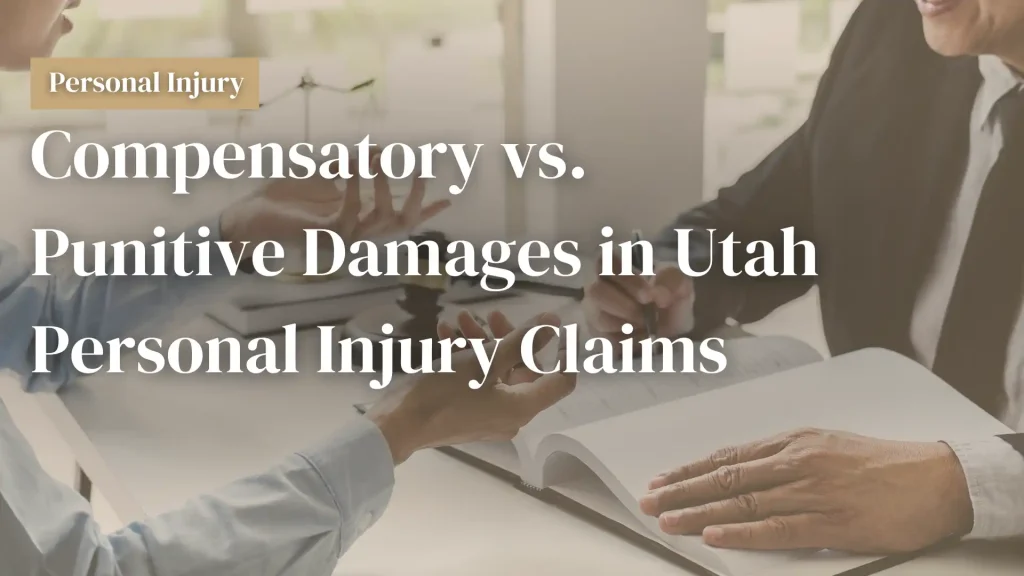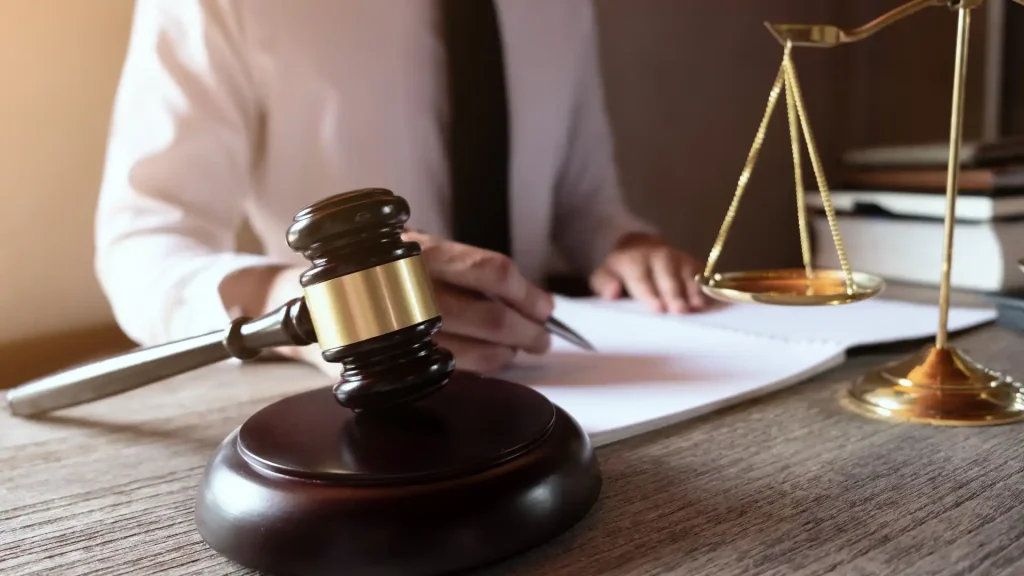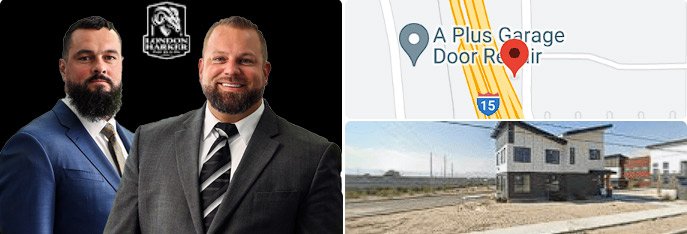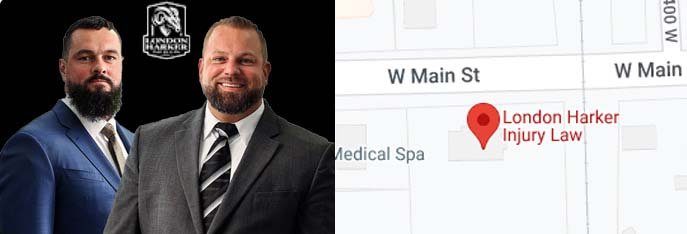Posted on Tuesday, September 24th, 2024 at 9:00 am

If you recently sustained injuries in an accident you didn’t cause, you might wonder what kind of compensation you could recover. In Utah, personal injury claims can include two main types of compensation: compensatory damages and punitive damages. (“Damages” is the legal term for money you receive to compensate you for your injuries and other losses from an accident.) Understanding compensatory vs punitive damages is crucial for maximizing your compensation.
At London Harker, our Provo, UT, injury lawyers understand the challenges you’re facing and aim to help you seek the maximum compensation possible. Our experienced team will work tirelessly to help you recover as much compensation as possible so you can rebuild your life and move forward from this difficult chapter. Read on for essential information on compensatory vs. punitive damages in Utah.
What Are Compensatory Damages?
“Compensatory damages” is the legal term for the money you receive in a personal injury claim to help cover the losses you’ve experienced because of your injuries. Courts award this compensation to make you “whole” again by addressing the accident’s financial and non-financial effects. There are two main types of compensatory damages: economic damages and non-economic damages.
Economic Damages
Economic damages cover the tangible, out-of-pocket costs you’ve had to pay because of your injury. These are typically easier to calculate because they involve specific amounts of money. Examples of economic damages include:
- Medical Expenses: Costs for hospital stays, surgeries, doctor visits, medications, and ongoing treatment.
- Lost Wages: Money you’ve lost because your injury kept you from working, including any future income you might lose if you cannot return to your job.
- Property Damage: The cost of repairing or replacing your vehicle or other property damaged in the accident.
Non-Economic Damages
Non-economic damages compensate you for the non-financial aspects of your injury, which can be harder to quantify. These damages are more subjective and can vary greatly depending on the circumstances. Examples include:
- Pain and Suffering: Compensation for the physical pain and emotional distress resulting from your injuries.
- Loss of Enjoyment of Life: If your injuries prevent you from enjoying activities you once loved, you can seek compensation for this loss.
- Emotional Distress: Compensation for anxiety, depression, or other emotional issues resulting from the accident.
What Are Punitive Damages?
A court may award punitive damages in personal injury cases, but they serve a different purpose than compensatory damages. While compensatory damages cover your actual losses, like medical bills or lost wages, punitive damages penalize the at-fault party for especially reckless or harmful behavior. The courts might also order someone to pay punitive damages to deter others from engaging in similar conduct.
Punitive damages are typically awarded in cases where the responsible party’s behavior was particularly egregious, such as in cases of drunk driving or intentional harm. Punitive damages are hard to recover, but when a court awards them, they can significantly increase the total amount of compensation you receive.
How Are Punitive Damages Calculated?
The courts typically calculate punitive damages based on the severity of the wrongdoer’s actions and the need to deter similar behavior in the future. Judges often use methods like the multiplier method to determine the appropriate amount. The multiplier method involves taking the amount of compensatory damages awarded and multiplying it by a certain factor, usually ranging from 1 to 5 or more, depending on how reckless or harmful the defendant’s conduct was.
Another approach courts might use is to consider the defendant’s financial situation. The idea is to set punitive damages at an amount that will have a meaningful impact on the wrongdoer so that the punishment is significant enough to deter future misconduct. Courts also look at the proportionality between compensatory and punitive damages, as they want to make sure that the punitive award is not excessively high compared to the actual harm caused.
These methods help make punitive damages fair and effective in punishing wrongdoers and discouraging others from engaging in similar behavior.
Does Utah Cap Punitive Damages?
Utah does not have an official cap on punitive damages. There’s even a state law that specifically says the cap on non-economic damages in medical malpractice cases does not apply to punitive damages. That said, it’s rare for punitive damages in a Utah personal injury case to exceed five times the plaintiff’s compensatory damages. This guideline keeps punitive damages from being excessive while still serving the dual purposes of penalizing the wrongdoer and deterring others from similar behavior.
There are some other restrictions on punitive damages in Utah. State law says that while the first $50,000 in damages goes directly to the injured party, they and the state split the remaining amount. Still, punitive damages can add significantly to the money awarded in personal injury cases.
Who Gets Punitive Damages?
According to Utah law, the courts can only award punitive damages if compensatory or general damages have already been awarded. Additionally, there must be “clear and convincing evidence” that the defendant’s actions were willful, malicious, or intentionally fraudulent, or that their conduct showed a knowing and reckless disregard for the rights of others. This high standard of proof ensures that punitive damages appear only in cases involving particularly egregious behavior.
However, there are exceptions to these strict requirements. For example, the limitations and standards for punitive damages do not apply in cases involving driving under the influence (DUI) or providing illegal controlled substances. In such cases, the process for awarding punitive damages is more straightforward due to the inherently dangerous nature of the conduct involved.
Cases Where Punitive Damages Were Awarded in Utah
 Because the requirements to obtain punitive damages are so strict, they’re fairly rare in Utah. One notable case where the injured parties received punitive damages occurred in 2021. In that case, a jury awarded a Utah couple $25 million in compensation after their daughter died from becoming entangled in unsafe window cords. The jury award included $24 million in punitive damages, as the lawsuit claimed the manufacturer hadn’t installed mechanisms to prevent the blinds from strangling children.
Because the requirements to obtain punitive damages are so strict, they’re fairly rare in Utah. One notable case where the injured parties received punitive damages occurred in 2021. In that case, a jury awarded a Utah couple $25 million in compensation after their daughter died from becoming entangled in unsafe window cords. The jury award included $24 million in punitive damages, as the lawsuit claimed the manufacturer hadn’t installed mechanisms to prevent the blinds from strangling children.
How We Can Help You Seek Punitive Damages
Recovering punitive damages is tough in Utah, but you’ll have an easier time with help from a capable legal team. London Harker Injury Law can handle all the legal work for you, including gathering evidence to support your claim, representing you at trial, and making the case for punitive damages to the judge or jury. For more information, call our office now at (772) 272-7274 or reach out online for a free consultation.



